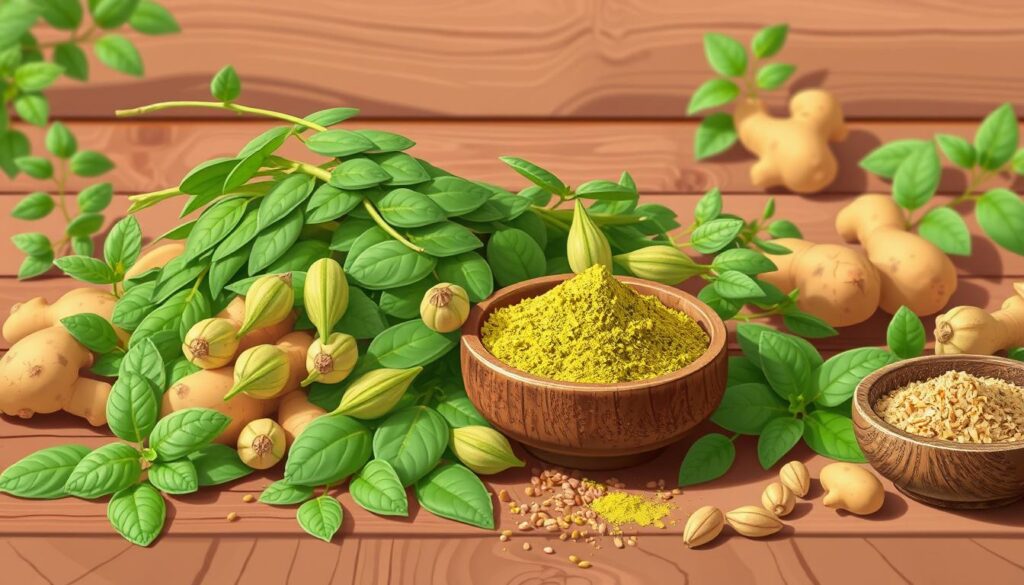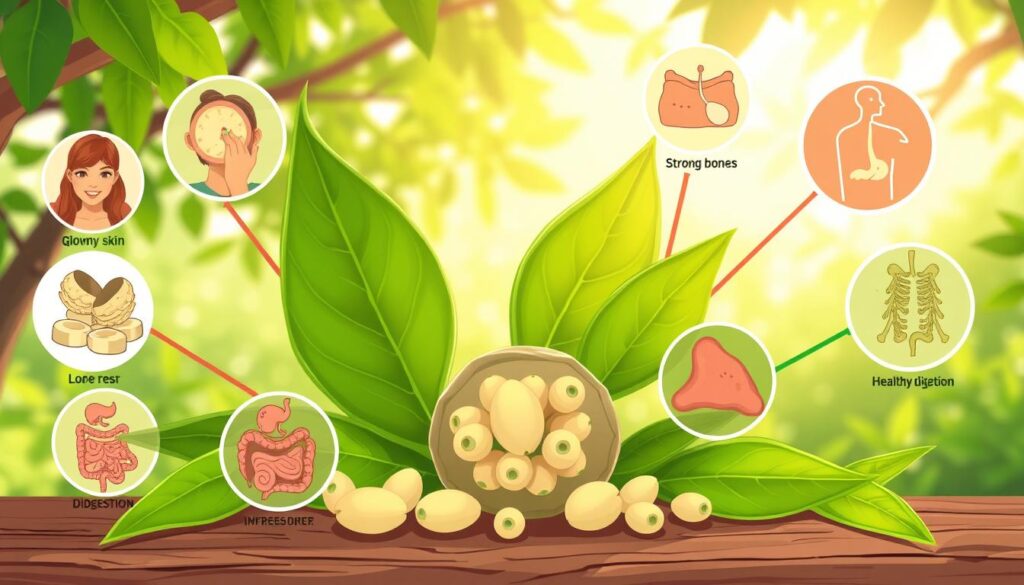Moringa, also known as the “miracle tree,” has been used for centuries. It’s known for its many health benefits. These include helping wounds heal faster and managing blood sugar levels.
Table of Contents
ToggleBut, more research is needed to know all its benefits. This article will tell you about moringa, its benefits, and side effects. It aims to help you decide if moringa is right for you.
What is Moringa?
Moringa is also known as the “miracle tree.” It’s a plant used for centuries for its health benefits. The Moringa oleifera is the most common type, found in India’s Himalayan foothills.
Moringa oleifera: The “Miracle Tree”
Moringa oleifera grows fast and can reach 10 meters tall. It’s called the drumstick tree and is full of nutrients. People use it for food and medicine because of its health benefits.
Moringa’s Nutritional Profile
Moringa is called a “superfood” because of its nutrients. A cup of fresh Moringa leaves has:
- 2 grams of protein
- 19% of the RDA of Vitamin B6
- 12% of the RDA of Vitamin C
- 11% of the RDA of Iron
- 11% of the RDA of Riboflavin (B2)
- 9% of the RDA of Vitamin A (from beta-carotene)
- 8% of the RDA of Magnesium
Also, Moringa pods are full of Vitamin C. They have 157% of what you need daily. Moringa has antioxidants that help with blood pressure and sugar.
Moringa’s Potential Health Benefits
Moringa is known as the “miracle tree.” It has many health benefits. It can protect and nourish your skin and hair. .
Protecting and Nourishing Skin and Hair
Studies on animals show moringa seed oil may heal skin wounds fast. It might do this by reducing oxidative stress. Some say it’s good for hair health too.
But, we need more studies, especially with humans. This will help us know more about moringa skin benefits and hair benefits.
Treating Edema and Inflammation
One study found moringa seed oil can reduce skin inflammation in mice. This suggests it might help with edema. But, we need more research to know for sure.

Liver and Cancer Protection
Moringa is called the “miracle tree” for good reason. It helps protect the liver and might stop cancer. In a study, guinea pigs ate moringa leaves. Those with more moringa had less bad cholesterol and triglycerides. They also had less liver inflammation.
Moringa has stuff like niazimicin that might stop cancer cells from growing. Scientists think moringa’s leaves, bark, and other parts might fight cancer. They might help with breast, liver, and other cancers. But, we need more studies to be sure.
Moringa’s antioxidants and anti-inflammatory stuff might help the liver and fight cancer. It slows down cancer cells in the prostate, lungs, and more. It even helps kill off bad cells.
Even though we’re still learning, moringa seems to be good for the liver and might prevent cancer. Always talk to a doctor before adding moringa to your diet. This is especially true if you’re already sick or on medicine.
Digestive and Stomach Health
Moringa, known as the “miracle tree,” offers many benefits for your stomach and digestive health. Its extracts may ease stomach problems. The fibrous pods help with digestion and might lower colon cancer risk.
Treating Stomach Upsets
Moringa’s laxative effects can help with constipation. Studies show moringa leaves can gently improve bowel movements. It also reduces stomach acidity by up to 85%, helping prevent and treat peptic ulcers.
Fighting Foodborne Bacterial Infections
Moringa’s antibacterial and antibiotic properties fight foodborne illnesses. It stops the growth of harmful bacteria like Staphylococcus aureus and Escherichia coli. These bacteria cause diarrhea and food poisoning symptoms. Adding moringa to your diet may boost your body’s defense against these bacteria.
Moringa is great for easing stomach issues and improving digestion. Talk to your doctor about how moringa can help with moringa digestive health and moringa stomach issues.

Moringa Benefits and Side Effects
Moringa is known as the “miracle tree” for its health benefits. But, it’s key to know both the good and bad sides of moringa supplements or products.
Moringa seems to have few serious side effects when taken in small amounts. It’s packed with antioxidants, vitamins, and minerals. These can offer many health benefits. Some of these benefits include:
- Potential protection against liver damage and cancer
- Improved digestive health and relief from stomach upset
- Reduced inflammation and edema
- Enhanced skin and hair health
- Potential management of diabetes and cardiovascular health
Even though moringa is mostly safe, caution is needed. Taking too much, over 70 grams a day, can cause stomach problems like diarrhea. The plant’s root and bark have toxic parts. These can cause nausea, vomiting, and paralysis if eaten in big amounts.
Before using moringa supplements or adding it to your diet, talk to your doctor. This is especially true if you’re on medications. Moringa might affect drugs for diabetes, HIV, or hypothyroidism. Pregnant and breastfeeding women should also be careful with moringa.
In short, moringa has many health benefits. But, it’s important to use it wisely and in small amounts. Always check with a healthcare professional before adding moringa to your routine. This ensures your safety and health.
Potential Benefits for Other Conditions
Moringa, known as the “miracle tree,” is being studied for many health benefits. It might help with rheumatoid arthritis and mood issues.
Rheumatoid Arthritis
Moringa extract could fight inflammation. This might help with moringa arthritis and rheumatoid arthritis. Its antioxidants and anti-inflammatory compounds could reduce joint pain and swelling.
Mood and Nervous System Disorders
Moringa might also protect the nervous system. It could help with conditions like multiple sclerosis and Alzheimer’s disease. Its effects on depression are also being explored.
Moringa’s uses are growing, from joint health to brain health. More research will show its full benefits.

Cardiovascular and Diabetes Management
Moringa, known as the “miracle tree,” is getting attention for heart and diabetes help. It’s full of antioxidants and anti-inflammatory agents like quercetin. These might protect the heart by stopping bad lipids and reducing inflammation, which are heart disease causes.
Research shows moringa leaf extracts could help with diabetes. It may help manage blood sugar and insulin levels. It also protects organs from damage, which can lead to diabetic complications.
But, we need more studies to know how much moringa helps with heart and diabetes. Research is ongoing to understand its effects. This could lead to new, natural ways to support heart health and diabetes care.
Adding moringa to your diet or supplements might be good for your heart and metabolism. But, talk to your doctor before changing your health routine.
Respiratory Health and Kidney Stones
Moringa is known as the “miracle tree.” It’s full of nutrients that might help with breathing and preventing kidney stones. Let’s dive into these benefits.
Treating Asthma
Moringa has compounds that could help with asthma and breathing issues. A study on guinea pigs showed it might improve lung function. This suggests it could be good for asthma and other breathing problems.
Preventing Kidney Stones
Some people use moringa to stop kidney stones from forming. Tests show it might stop minerals from building up in kidneys. But, we need more studies to be sure it works.
Moringa is packed with vitamins, minerals, and antioxidants. These might help with breathing and preventing kidney stones. Still, talk to a doctor before adding moringa to your diet.
Using Moringa as a Nutritional Supplement
Moringa is known as the “miracle tree.” It’s packed with nutrients. You can take it in many ways to get its health perks. Choose from supplements, powder, leaves, or other forms.
Forms and Preparation Methods
Moringa leaves are great raw, cooked, or dried. They keep their nutrients for months. Blend them into smoothies or use them like spinach.
Dried moringa powder is good in curries or on rice. Other parts like bark, seeds, and extracts might also help your health. Moringa seed oil, for example, is full of oleic acid.
It’s also used in beauty products and as a lubricant. The leftover seed cake is rich in nutrients. It’s great for gardening.
Moringa comes in pills, teas, and oils. Pick what suits you best. But, talk to a doctor first. Too much moringa can cause problems.
Learning about moringa’s forms and how to use them can help you add it to your diet. It might improve your skin and overall health.
Safety Considerations and Side Effects
Moringa seems safe, but it’s smart to talk to your doctor first. It might affect some medicines. Always follow the label’s dosage.
Moringa could lower blood pressure or slow your heart. It might also cause stomach problems or affect fertility. Animal studies show it could harm the liver and kidneys.
Pregnant women and those taking Januvia should not use moringa. It could mess with blood pressure medicines. Moringa bark might cause uterine contractions, which could lead to miscarriage.
- Moringa may interact with medications that affect blood pressure, potentially causing hypotension or bradycardia.
- Compounds in moringa bark may stimulate uterine contractions, potentially leading to miscarriage or preterm labor.
- A chemical isolated from roasted moringa seeds has been shown to cause cell mutations in laboratory studies.
- Moringa may interfere with fertility and is not recommended for pregnant or breastfeeding women.
- The laxative properties of moringa may cause digestive issues like upset stomach, gas, or diarrhea in some individuals.
- Moringa leaves have been associated with liver and kidney damage in animal studies, so caution is advised.
Always check with your doctor before using moringa. Follow the dosage and know about possible side effects. Using moringa in moderation is best.

Conclusion
The moringa benefits summary shows that this plant is truly special. It’s called the “Miracle Tree” for good reason. It can help your skin, hair, and even fight off infections.
Moringa might also help with your liver, prevent cancer, and manage diabetes. It’s full of good stuff for your health.
But, the moringa research summary says we need more studies. We need to make sure it’s safe and works well for these uses. Always talk to a doctor before trying new foods or supplements.
By knowing what moringa can do, you can use it wisely. It’s a great addition to a healthy lifestyle. As scientists learn more, moringa could help you even more.
FAQ
What is moringa and what are its health benefits?
Moringa oleifera is a tree known for its health benefits. It’s also called the drumstick tree, miracle tree, and horseradish tree. It’s packed with vitamins, minerals, and antioxidants.
Moringa is low in fat and has no bad cholesterol. It can help with skin, hair, digestion, infections, and even cancer.
Can moringa help with wound healing and inflammation?
Animal studies suggest moringa seed oil may heal wounds faster. It might do this by reducing oxidative stress. Moringa also has anti-inflammatory properties.
This could help with conditions like ear edema.
Does moringa have benefits for liver health and cancer prevention?
Moringa might prevent cancer due to compounds like niazimicin. It can stop cancer cells from growing. Studies show it could kill cancer cells in the breast, liver, and colon.
It also supports liver health in guinea pigs.
How can moringa help with digestive and stomach issues?
Moringa extracts might treat stomach problems. Its fibrous pods aid digestion and may prevent colon cancer. Moringa leaves can help with constipation.
It has antibiotic and antibacterial properties. This can prevent infections like Staphylococcus aureus and Escherichia coli.
Are there any side effects or safety concerns with taking moringa?
Moringa seems safe but can interact with medications. It may lower blood pressure and slow the heart rate. could also cause uterine contractions and affect fertility.
It may upset the stomach and increase liver and kidney damage risk in rats. Pregnant women and those on certain meds should avoid it.
How can I incorporate moringa into my diet?
Eat moringa leaves fresh, cooked, or as dried powder. Blend them into smoothies or use as spinach substitute. Add dried moringa powder to curries and serve over rice.
What other potential benefits does moringa have?
Moringa may help with heart health, diabetes, and breathing. It could also treat rheumatoid arthritis and nervous system issues. But more research is needed.
Source Links

This article is medically reviewed by Dr. Chandril Chugh, Board-Certified Neurologist, providing expert insights and reliable health information.
Dr. Chandril Chugh is a U.S.-trained neurologist with over a decade of experience. Known for his compassionate care, he specializes in treating neurological conditions such as migraines, epilepsy, and Parkinson’s disease. Dr. Chugh is highly regarded for his patient-centered approach and dedication to providing personalized care.








